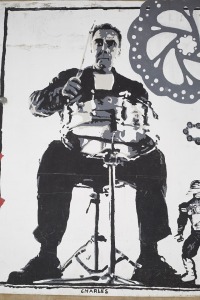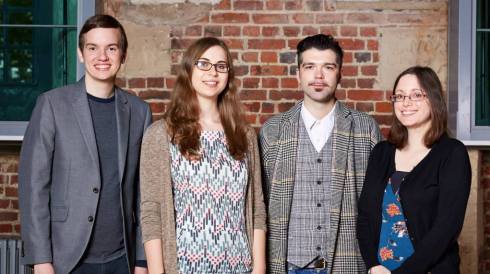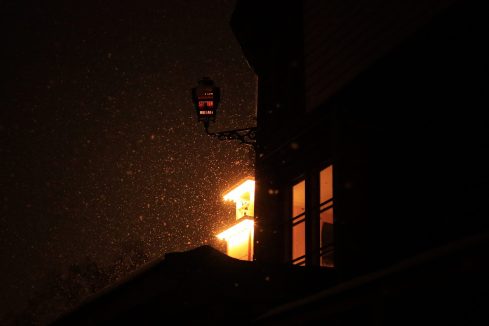For their ‘Ecstatic Dances’ concert tour this month, Manchester Collective team up with Danish instrumentalist and storyteller Poul Høxbro in a programme of “Nordic myths, songs and dances; ones that bring a chill to the air” – esoterically-inclined repertoire works, new material and transformed folk songs from England, Scotland and Scandinavia. On this occasion, the Collective are coming out as an augmented quintet – string quartet plus electric bass guitar – with Poul, sometimes called “the great man of small instruments”, working from his armoury of flutes and percussion, including tabor, pipe and the quease-inducing rhythm bones (crafted from the ribs of a diseased, or possibly just deceased, Irish cow).
Amongst the folk songs “from some pretty dark places” which are scheduled for performance is the Norwegian ‘Fanitullen’, or ‘The Devil’s Tune’, apparently “conceived during a violent and bloody wedding in 1724 which the Devil himself attended.” Similarly mythical themes should be stirring in their performance of occult-minded composer Peter Warlock‘s ‘Capriol Suite’; while various excerpts from Thomas Adés‘ ‘Arcadiana’ “evoke various vanished or vanishing idylls” either aquatic or pastoral, plus an evocation of the tomb of Baroque storytelling painter Nicolas Poussin. There’ll also be new work, a world premiere from contemporary composer Paul Clark, most recently recognised for his New York project ‘Norma Jeane Baker of Troy‘ with Anne Carson, Renee Fleming and Ben Whishaw (a spoken-sung transfiguration of Euripedes’ ‘Helen of Troy’).
From the Collective: “While we were building the show, we had a moment when we realised that this combination of instruments has literally never been heard before. The set that we are presenting is all new – terrifyingly, ink-barely-dry new. Ancient music, brought vividly to life for 21st century ears… Full disclosure – ‘Ecstatic Dances’ feels scary for us. New work is always frightening, mostly because until you start making it, you never really know what you’re going to end up with. Fortunately, we’re not particularly fond of being comfortable.”
* * * * * * * *
On 16th January, Scottish classical guitarist Jamie Akers will be setting up in London’s Old Operating Theatre as part of his ongoing project to stir up more interest in neglected nineteenth century female composers for the guitar (following his release of new performances of their music on 2018’s ‘Le Donne e la Chitarra’ album).
“ The early 19th century has been described as the first golden age of guitar music. A time from which, a treasury of music of great emotional depth and technical brilliance was bequeathed to posterity. Profound works, written by the great composers and virtuosos who populated the concert stages and publishing houses of the age, have been continuously in print and regularly performed for almost two hundred years. However, alongside the famous names and renowned masterpieces, some of the most original and exciting music of the era has fallen into obscurity.
“Languishing in libraries, ignored by performers and neglected by archivists, the loss of the repertoire of 19th century women guitar composers has caused an imbalance in our view of history, as well as a notable vacuum in our artistic heritage. The absence of these works from concerts and recordings has led to a mistaken belief that before the modern era, women composers were a rarity and women’s creative impulses were either suppressed or unformed.
“This concert is intended to remedy this misperception, giving voice to the forgotten outpourings of artistic sensibilities silenced by unforgiving prejudice. While classical music has traditionally been perceived as a male dominated affair, many women composers throughout its history have written unique and expressive works. From the mediaeval religious works of Hildegard von Bingen to the suffragette anthems of Ethel Smyth, the creative impulses of women composers have taken flight in spite of societal pressures and historical neglect.
“The composers featured in this concert, Athenais Paulian, Emilia Giuliani and Catharina Pratten were highly respected in their day. They were society figures, famed performers, teachers of royalty, whose works were widely disseminated and gained international acclaim. Given the recognition they received during their lifetimes, the subsequent neglect of their music highlights the ongoing struggle to achieve equality women composers face, an issue this concert aims to address.
“This is a rare opportunity to experience the breadth of expression, formal mastery and emotional heights that the music of these unjustly neglected composers achieved and which, despite our modern advances in equality, has yet to secure the respect and recognition it deserves.
“The music concert will be preceded by an introduction to and demonstration of how the old operating theatre was used from 1822 until 1862. The space where the music will pay was once the room where women in the 19th century went through surgery without anaesthesia nor antiseptics. Join us for this incredible experience!”
* * * * * * * *
On 24th January, London chamber group Eos Ensemble play IKLECTIK. The regular trio of the two founder members (composer/clarinettist Paul Evernden and violinist Angela Najaryan) plus regular pianist Thomas Ang are on this occasion expanded by the addition of cellist Corinna Boylan in a typical programme of mingled classical and obscure contemporary chamber music.
 It includes Linda Catlin Smith’s ‘Among The Tarnished Stars’, a piece which the composer has described as “travers(ing) a variety of terrains, usually through the variation, or re-translation, or reconsideration of simple things, harmonies, melodies, intervals. I was especially interested in seeing what I could do with the various sound colours of these instruments, sometimes looking for blend, sometimes for independent pure lines. I am fascinated with small changes, subtle gradations and shadings. I like how these things contribute to something we might almost call ‘mood’.”
It includes Linda Catlin Smith’s ‘Among The Tarnished Stars’, a piece which the composer has described as “travers(ing) a variety of terrains, usually through the variation, or re-translation, or reconsideration of simple things, harmonies, melodies, intervals. I was especially interested in seeing what I could do with the various sound colours of these instruments, sometimes looking for blend, sometimes for independent pure lines. I am fascinated with small changes, subtle gradations and shadings. I like how these things contribute to something we might almost call ‘mood’.”
Also on offer is a performance of deep listening pioneer Pauline Oliveros’ ‘Tree/Peace’ (a seven-part set of listening/reacting sonic explorations which, via dynamics, articulations, phrasing, sectioning and styling, mimics the life cycle of a tree) and Philip Cashian’s ‘Caprichos’ (an uneasy set of pieces inspired by various grotesques by Goya which originally satirised 18th century Spanish society). The evening ends with Olivier Messiaen’s prisoner-of-war camp classic ‘Quatour Pour La Fin Du Temps’, with its mingled influences of birdsong and Biblical revelation.
Various previous versions below:
https://vimeo.com/112057005
* * * * * * * *
Dates:
Manchester Collective with Poul Høxbro: ‘Ecstatic Dances’
- The Crypt @ Leeds Town Hall, The Headrow, Leeds, Yorkshire, LS1 3AD, England – Wednesday 15th January 2020, 8.00pm – information here and here
- Royal Conservatoire of Scotland, 100 Renfrew Street, Glasgow, G2 3DB, Scotland – Thursday 16th January 2020, 7.30pm – information here and here
- The CLF Art Café, Block A, Bussey Building, 133 Copeland Road, Peckham, London, SE15 3SN, England – Friday 17th January 2020, 8.00pm – information here and here
- The Stoller Hall, Hunts Bank, Manchester, M3 1DA, England – Sunday 19th January 2020, 5.00pm – information here and here
Twilight Lives: Surgery & Music for and by 19th Century Women
The Old Operating Theatre Museum, 9a St Thomas St, Southwark, London, SE1 9RY, England
Thursday 16th January 2020, 6.15pm – information here, here and here
IKLECTIK presents:
Eos Ensemble
IKLECTIK, Old Paradise Yard, 20 Carlisle Lane, Waterloo, London, SE1 7LG, England
Friday 24th January 2020, 7.00pm – information here, here and here





























































